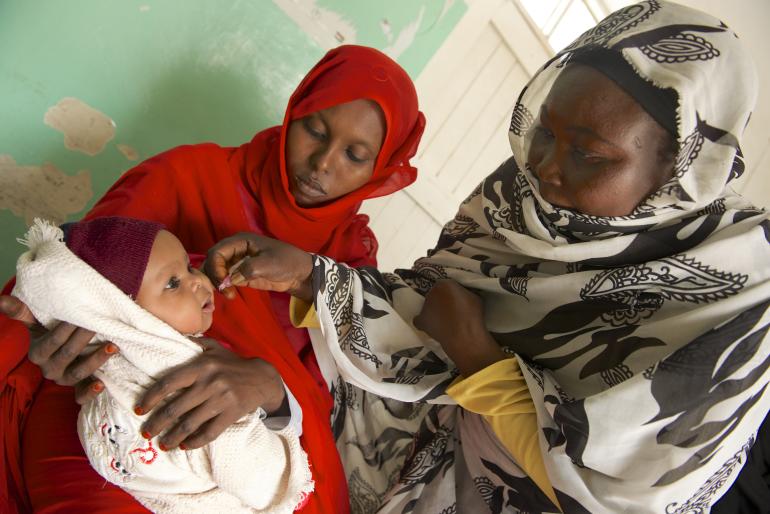 Credit: UNICEF/UNI165938/Shehzad Noorani
Credit: UNICEF/UNI165938/Shehzad Noorani
Khartoum, 18 March 2023 – Sudan’s Federal Ministry of Health, with support from the World Health Organization (WHO) and the United Nations Children’s Fund (UNICEF), on 16 March launched round one of a nationwide vaccination campaign to urgently stop a new polio outbreak. Round one will run from 18 March 2023 for 4 days, with the second round following Ramadan in May, as vaccinators go door to door across the entire country to reach and protect an estimated 8.9 million children under 5 years.
The risk of polio increased in Sudan after a 4-year-old boy in Kereinik locality, West Darfur state tested positive for poliovirus in December 2022 after developing weakness of the limbs, known as acute flaccid paralysis (AFP) – the most common indicator of polio infection. Typically, by the time a single child has been paralysed by the poliovirus, many more have been infected, although not necessarily developed paralysis. The nationwide vaccination response aims to close immunity gaps and stop transmission in order to protect other children from avoidable lifelong paralysis. Dr Dalya Eltayeb, Primary Health Care Director, Federal Ministry of Health, said, “Our success in stopping the polio outbreak in 2020 demonstrated the strength of Sudan’s public health workers, at both the federal and state levels. This new outbreak, caused by an importation of the poliovirus, can be stopped by the same skills and strategies we used to stop the last outbreak. I am confident in our ability to rise to the challenge and protect the health and well-being of children in Sudan.”
Polio outbreaks arise when not enough children have the protection they need from poliovirus. In an outbreak context, parents and caregivers are encouraged to accept the vaccine every time it is offered, even if the children are up to date on their routine immunization. Children living in areas with high population movement, limited access to safe drinking-water and sanitation facilities, and near international borders are at particularly high risk of infection, which can result in lifelong paralysis. Dr Ni’ma Saeed Abid, WHO Representative in Sudan, said, “This campaign comes at a crucial time as Sudan prepares to strengthen immunity against the recently declared poliovirus outbreak. I call on parents and caregivers to ensure that children under five receive vaccination in this national campaign, and to vaccinate their children against other diseases, according to the routine immunization schedule. Together, we closed a polio outbreak before, thanks to the dedication and skill of Sudan’s health workers, frontline volunteers and its Federal Ministry of Health leadership – and we can do it again.”
UNICEF’s representative in Sudan, Mandeep O’Brien, said, "We must act now to stop the spread of polio in Sudan and to prevent further cases of this debilitating disease. Every Girl and boy should receive life-saving vaccines to protect them from preventable diseases. We will work closely with partners to provide access to vaccines, and to mobilize the public to increase vaccination rates. This campaign also gives us the opportunity to reach children with vVitamin A supplements, helping them to resist illness, protect their vision and reduce their risk of death. Together, we can build a healthy and resilient society with high levels of immunity, protecting our children from the devastating impact of diseases such as polio."
Sudan’s Federal Ministry of Health, partners including the Global Polio Eradication Initiative, Sudanese civil society and Rotarians collectively urge all parents and caregivers to make children under age five available to vaccinators during both rounds of this campaign. Only through vaccination can immunity levels be raised so that every child in Sudan is protected from paralytic polio.
Contacts
Owen Watkins
Chief of Communication, Advocacy & Partnerships
UNICEF Sudan
Sara Williams
Communications Officer
WHO Regional Polio Programme
About WHO Sudan
The World Health Organization in Sudan works in close collaboration with the Federal Ministry of Health and partners to support the country in reaching its national health development goals and to ensure that all health efforts are coordinated.
Follow WHO on Twitter and Facebook
About UNICEF
UNICEF works in some of the world’s toughest places, to reach the world’s most disadvantaged children. Across more than 190 countries and territories, we work for every child, everywhere, to build a better world for everyone.
For more information about UNICEF and our work for children, visit www.unicef.org/sudan/
Follow UNICEF on Twitter, Instagram and Facebook


